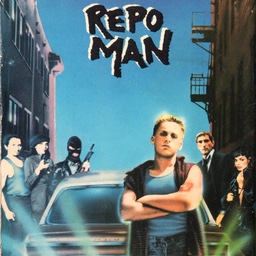- Damaged, by Black Flag
- The Idiot, by Iggy Pop
- Suicidal Tendencies
- Wild in the Streets, by The Circle Jerks
- The Record, by FEAR
- Electrify Me, by The Plugz: Not on iTunes or anywhere legit, DIY label bands don't survive long, do they?
Blog
What I'm Watching: Ultraviolet (2017)
No, not the vampire movie, nor the shitty DRM video system. The Polish crime drama. It is all but impossible to search for a title like this.
A Buffy-like chick: blonde, vapid, argumentative, shitty family life, etc., except she's supposedly 30 instead of 16, is working as an Uber driver in Lódz, Poland, sees a girl thrown off a bridge. The cops call it a suicide, she disagrees, and starts investigating. Finds a quasi-secret society of "Ultra-Violets" (the explanation of the name is so ludicrous you have to watch to hear it) who hang out in a Slack with a purple backslash icon and solve murders while supposedly doing their real jobs.
Social media-solves-crime is not a bad premise for a show, even if mostly social media-causes-crime in reality, and the chat and screens are usually captioned well enough to make sense despite being in Polish.
Lódz really isn't grim enough for my "Grim Scandinavian Drama" taste, just a little run-down, not cheerful enough for it to be ironic like Death in Paradise. It's like setting a crime drama in Boise or Salt Lake City; death's a bit of a relief, but not an omnipresent gloom.
The acting's a problem. Buffy, er, Ola wavers from nonentity to annoying. The useful cop is barely present. There is less chemistry between them than between noble gasses in sealed glass jars. Mom's a crying stereotype. Older dude Henryk is not bad, he might be an actual actor. The dirty cop is either stoic or stoned. The "Ultra-Violets" (snicker) are only on-screen for a line or two at a time, mostly from behind.
If they got some acting lessons, this could be watchable; as it is, it's on the "occasional watch if I'm bored" list.
★★★☆☆
What I'm Reading: Software/Wetware by Rudy Rucker
- Ware Tetralogy: Software, Wetware
I must've read Software on release in 1982 or in the next year; heavy stuff for a 12- or 13-year-old little mutant Mark. I've reread it a number of times since, and got more out of it each time. This time, it's notable how short and fast it is for so much information.
I guess I should mention, since some people are neurotic about this, there's a lot of sex, drugs, nudity, more sex, really weird drugs, cannibalism, and bodily functions. Also a lot of violence, but the people who are most neurotic about harmless, consensual sex or drugs seem to think murdering people is fine, respectable behavior. This is why you Humans freak me out and repulse me.
Software (1982): Cobb Anderson goes from crusty old drunk to immediately going along with ("waving") the Boppers' (AI robots he created and then freed from Asimovian slavery) plan to immortalize some Humans by the messiest process possible. Sta-Hi Mooney's given very short shrift here, much of what I remember of him actually comes from the next book.
The Bopper architecture and programming are discussed in depth, and the Little Boppers' war on the Big Boppers (centralization instead of anarchy) is surprisingly, pointedly relevant to current reality for a 36-year-old book. Since the book is set in 2020, and Cobb made the Boppers for Lunar mining, uh, we're WAY fucking behind on space and robotics in our shitty timeline.
The religion Personetics is super obvious as a scam, and yet Humans really fall for Dianetics (in my OMNI rereads, Dianetics is advertising every issue with this faux-serious tone), or for that matter any religion, which are all just scams to take your money and control you. And then everything goes sideways, lack of backup systems and over-controlling middle management ruin everything. Fin.
★★★★★
Wetware (1988): I read this just going into college to fuck my brain up. Probably haven't read the whole thing since then, skimmed it in parts. The first half following Sta-Hi, er, "Stahn" Mooney and a number of boppers in a city stolen from the boppers on the Moon, is great. FANtastic, full of weird drugs, sex, murders, people with rats in their heads. The Boppers are desperate and vindictive here, war and evolution pushing them to the edge.
Second arc about Della and her new "son" on Earth is annoying, weird, and… As Cobb says, "Della's parents are jerks, I'll tell you that much. What kind of couple is named Jason and Amy?" Cousin Willy Taze screwing around (sometimes literally) with AIs is the only redeeming part of this entire shitty set of chapters. The Gimmie (easily the best name ever for the Federal government) reacts only with murder and fear, like usual. While I mostly agree with the principles of "Manchile's Thang!", the free love equality cult, I dislike every part of the delivery.
Third arc back on the Moon, and the end of the Boppers, seems a little formulaic crime drama for a while, until it gets into what price Stahn's willing to pay for revenge and to recover his wife in any form. The weapon used is interesting; as our chips get more complex, side attacks like that look more practical. The moldies and Happy Cloak's return are all friendly and heroic here, which is… not how it'll be in later books.
★★★★☆
The first book is under 180 pages, and it flew past in a couple days; it's dense but fast, a lightspeed bullet to shatter your brain. Second's just over 200, feels much longer, and took me a couple starts; most of the good parts in 5 days, but then after the second arc I paused a couple weeks. Freeware is 300. Realware is another 315. And I recall these aren't any less dense. May need some lighter fare first.
What I'm Watching: Jack Ryan
Back in the Good Old Days of the Cold War, I read the hell out of the original 3 Jack Ryan books, and I love the Harrison Ford movies, considerably less the Baffleck "Sum of All Fears". The spinoff pulp books and shitty videogames, far less so. Amazon's now got "Tom Clancy's Jack Ryan" on Prime, let's see.
Slow start, but obviously a War That Never Ends in Middle-East thing.
Blank-faced drone John Krasinski as Ryan is generically skilled, has war flashbacks while he stares emotionlessly at a ceiling, writes "SQL queries" that pop up graphical displays. He's like someone's shitty PC in Millennium's End RPG, and I don't believe from his walking meatstick "acting" that this Ryan has a PhD in Economics, or even a GED, or really more than a brainstem.
Wendell Pierce (the Bunk!) is promising, but he's playing a last-chance-don't-fuck-this-up bureaucrat section chief, nothing exciting yet.
After a bit, Ryan is Proved Right as in all Jack Ryan stories, and dragged into the field from a party for a rich asshole & his generically pretty but vapid blonde daughter.
Interrogation and the vaguely placed prison are, uh, unpleasant, but nobody's being tortured. Yet. Bombs and guns always get into these, and it's fine but very console-shooter: Indistinct action around a squad shooting aimlessly (because without mouse you can't aim).
It all seems competently produced, poorly acted, and written by very unimaginative frat boys who've played too much Tom Clancy's Rainbow Seven. Long-dead Tom Clancy is the only real writer on the show, and this is "ripped from the headlines" by some necrophiliacs last employed on garbage like Lost.
I'll probably do another couple eps to see if the Bunk does anything good, but I hold little hope unless they replace almost the entire cast and writing room.
★★☆☆☆
Julia More Packaging & Code
I don't just drink coffee or booze, watch movies and Internet drama, and look cool. I code sometimes, too! Who knew?!
Carrying on with my experiment in Julia, packaging has another step needed to make references. For instance, Ansi uses Geometry, so:
Geometry/Project.toml:
authors = ["Mark Damon Hughes "]
name = "Geometry"
uuid = "e3172796-a620-11e8-2cbf-612649bb77f8"
version = "0.1.0"
[deps]
Ansi/Project.toml:
authors = ["Mark Damon Hughes "]
name = "Ansi"
uuid = "72992c94-a620-11e8-3d05-55611ea0dbd0"
version = "0.1.0"
[deps]
Geometry = "e3172796-a620-11e8-2cbf-612649bb77f8"
Ansi/Manifest.toml:
[[Geometry]] repo-rev = "master" repo-url = "/Users/mdh/Code/CodeJulia/Geometry" uuid = "e3172796-a620-11e8-2cbf-612649bb77f8" version = "0.1.0"
All the boldface code is what I wrote/copy-pasted, the rest is generated by juliaMakePackage.zsh. I may go ahead and make a tool to link projects, because it's so error-prone. In fact, I cheated, and made a single Manifest.toml which I copy to all projects so far, and can replace whenever something updates.
Anyway, this gets me to a nice state where I can write using Ansi in my project and it'll just find it. IIUC, if I move all the libraries to a public repository, I can just change the repo-url and the packages are downloaded into ~/.julia cache somewhere.
I still haven't followed up on making a binary application; the more I look into that, the jankier it seems, more like something to defer until there's an official solution. Putting a real UI on it is also something to work on, but that's much more doable.
Coding
I've written a lot more code, over 1000 LOC, not just screwing around with packages. Mostly this is enjoyable, it's a nice systems programming language. The ugly parts haven't yet driven me insane, they're just things to work around or ignore. Far less frustrating than almost any other new language; Rusty Nail In Your Head and Go Fuck Yourself Its Google aren't my favorites.
Strong typing really is a pain in the ass. Declare a variable or struct field foo, and it takes anything. Type it with foo::AbstractString, and you soon learn nothing is not a string; foo::Union{AbstractString,Nothing} is necessary to be nullable. Ick.
Enumerations
Enumerated types @enum are disappointing. They're a little smarter than C enums, but not as useful as Java enums. They just represent a value; but you have to cast them to Int every time you use them for their value, so too painful to use them as array indices. Or as characters, a thing I like a lot for debugging. And they're not easy to reflect on:
julia> @enum Terrains begin
Ter_Floor = Int('.')
Ter_Wall = Int('#')
end
julia> Ter_Wall
Ter_Wall::Terrains = 35
julia> Int(Ter_Wall)
35
julia> Char(Int(Ter_Wall))
'#': ASCII/Unicode U+0023 (category Po: Punctuation, other)
julia> String(Char(Int(Ter_Wall)))
ERROR: MethodError: no method matching String(::Char)
julia> string(Char(Int(Ter_Wall)))
"#"
julia> # FFS
julia> string(Ter_Floor)
"Ter_Floor"
julia> # Surprisingly easy!
julia> instances(Terrains)
(Ter_Floor::Terrains = 46, Ter_Wall::Terrains = 35)
julia> # Shit, this is a named tuple, not a dictionary!
julia> useful_instances = Dict()
Dict{Any,Any} with 0 entries
julia> for v in values(instances(Terrains))
useful_instances[ string(v) ] = v
useful_instances[ string(Char(Int(v))) ] = v
end
julia> useful_instances
Dict{Any,Any} with 4 entries:
"Ter_Floor" => Ter_Floor
"Ter_Wall" => Ter_Wall
"#" => Ter_Wall
"." => Ter_Floor
julia> # JFHC
That was an annoying adventure to get a simple reverse lookup.
Nine Inch Wednesday Music
Don't Be a Dick
So, Wil Wheaton ( previously "I Hate Twitter" ) was just chased off the Fediverse (he still has an account on a siloed non-federating instance, which isn't really useful to anyone else). His last statement's pretty clear, so I put that down below.
"Please do your very best to be kind to each other. The world is a terrible place right now, and that's largely because it is what we make it."
I know some of the people doing the harassing. There's no point in even arguing with them: They've decided he's in Two Minutes Hate, perhaps because he has a friend whom they don't like, and won't consider "Don't be a Dick", or having empathy, tolerance, or self-awareness that some of them aren't such great friends to have, for one hot second.
While Gargron has condemned harassment, it doesn't fix the problem, since there are entire instances where 4chan-like behavior is accepted; all you can do is block accounts or those entire instances, and it still poisons the Federated timeline for a while.
I'm not sure any level of moderation fixes this shit.
This is why I highly recommend owning your own blog, and broadcasting that out to other services where people can read it; even better, read this and many other blogs in your RSS aggregator or RSS reader ( currently free! ) of choice. It's OK to put some ephemeral chat on other services, but remember those are owned by other people, and are easily attacked by angry, stupid mobs. If a stupid mob shows up here, I don't approve their comments and it's done. It's the Castle Doctrine of online posting.
Wil Wheaton @wilw August 29, 2018, 3:02 PM https://mastodon.cloud/@wilw/100635779449174251 (will be a dead link soon)
I have been notified by an Admin here that they are getting 60 reports a day about my account. As far as I can tell, I'm not breaking any rules, and I've done my best to be a good person here. But this admin is going to suspend my account.It's the Admin's instance, so I fully support their choice to eliminate a source of frustration, but something to consider: a person who is doing nothing wrong can be run off one instance by a mob from another instance. That seems ... not cool. 1/x
But it's been made very, very clear to me that I am not welcome in the Fediverse, and I hear you. I hoped to find an alternative to the birdsite where I could find the same fun community that existed over there in the beginning, and it's clear to me that I won't be finding that. Before I leave, I want to just make something very clear, because I've spent most of my life being yelled at by people who don't know me at all, and I want the record to be clear. 2/x
During GamerGate, I was dogpiled and mobbed and brigaded and attacked by thousands of accounts. I started using a blocklist that was supposed to help stop that. I did not know that the blocklist I signed up for also had a lot of trans women on it. When I found out, I did everything I could to remove those women from the list I shared. When there were still innocents on the list, I stopped sharing the list entirely. Despite this, a mob has decided that I'm anti-trans. 3/x
This lie that I am anti-trans, or anti-LGBQ, is deeply hurtful to me (I know it's nothing like the pain LGBTQ people deal with every day, as they simply try to exist in a world that treats them so badly, but it is still hurtful in its own way to me). I just want to make it extremely clear: that is a lie, and the people spreading it are misinformed.
So I'm leaving the Fediverse, which has treated me with more cruelty, vitriol, hatred, and contempt than than anyone on the birdsite ever did. 4/x
I know that I'm well-off, well-known, and as a CIS white hetro dude in America, I live life on the lowest difficulty setting. I know that I have very little to complain about.
But I still have feelings, and I really do care about the world and the people in it. What I see is a lot of anger and cruelty directed at the IDEA of me, from people who I just hope don't realize that it really does hurt me, in my heart, to be accused of being someone I am not, and to be the target of a hateful mob. 5/x
Anyway, take your victory lap and collect your prizes. You've made it clear that I'm not welcome here, and even though I disagree with the action this Admin is taking (banning me when I didn't break any rules doesn't seem right), I respect and support the Admin's decision to run their instance the way they see fit.
Please do your very best to be kind to each other. The world is a terrible place right now, and that's largely because it is what we make it.
Bye.
6/end
What I'm Watching: Star Wars the Last Jedi
In the "that took a long time" category, I finally hit play on SWTLJ in my Netflix queue. I've been disappointed in all the new ones, so I didn't expect to like this. I'm drinking cheap wine and not in a great mood, perfect.
SPOILING THE ENTIRE MOVIE STOP DO NOT CONTINUE UNLESS YOU DON'T CARE, WHICH IS TOTALLY REASONABLE. THIS SUCKS
Holy shit this starts dumb, with Poe crank-calling Hux. I thought that was a joke meme, but no, it's actually a scene with "Admiral Hugs" and "your mother" jokes. The single fighter vs giant starship point defenses thing is nonsense especially since they should have learned since the Death Star. The bombers have really shitty fire control systems, and then somehow are gravity-fed. In space. They're not missiles, they're "bombs" which drop "down". What is down? So stupid.
Old Man Luke is annoying, but he's doing the Yoda thing, so annoying is in character for once. That's the only plot- and character-consistent thing I see in this shitshow.
Drinking intensifies.
The long tail chase with the few Resistance and First Order ships, and the centralized command system they use where one shot can behead the fleet, is so stupid. Scatter the ships to the wind, with randomized meetup locations, and no amount of tracking will help. Everyone in here is an idiot; Finn's attempt to flee is the only sign of sanity.
Now let's zoom off to a sidequest at a casino, like I do in JRPGs; sure, sure, fate of the world, first I have to race and breed Chocobos. The casino should be fun, altho it looks too much like a modern Vegas casino. Instead it's preachy because Rose hates fun. Also there's no way these scruffy degenerates get into a classy casino with a dress code. Also nobody in this will be implanted with Ovion eggs, or have Cait Sith join their party, which is what they deserve.
The endless "psychic phone calls" between Rey and Kylo are like a teenage soap opera, and the low-tech camera cutting is awful. Can't be bothered to even project force ghosts in the scene? Actually, now that I think of it, there are very few scene wipes for transitions in this, which is why it feels so jarring. It's all hard cuts with no context. The director's incompetent.
Burning down the Jedi "library" is typically ham-fisted metaphor for Disney Star Wars burning all the Expanded Universe and classic Star Wars. They don't care, and the callow youts of today aren't capable of reading. Yoda drones on and on, which is not at all Yoda-like, but the writer's a moron and doesn't know or care.
The mutiny is terribly executed. Admiral Bligh, er, Holdo is incompetent, but Poe has no idea how to use handcuffs or a brig? Abandoning warships so you can hide, when the First Order fleet still has scanners, is moronic. Instead of all but 6 ships exploding, it really should be all.
Drinking intensifies.
Snoke's always been a bad ripoff of the Emperor, but at least the hologram in The Force Awakens left the possibility he'd be 1m like Yoda; nope, he's human-sized, and basically parrots the Emperor's lines from Return of the Jedi. The duel in the throne room isn't bad, not amazing but the only good, Star Wars-like content in this film so far.
The only characters with any chemistry in the entire movie are Poe and BB-8. In The Force Awakens, it looked like Poe and Finn were gonna hump right on camera; they barely look at each other here. Rose tries to pull off a relationship with Finn, but it's not there.
I look back at Star Wars, and the love quadrangle between Luke, Leia, Han, and Chewie was amazing. They were junkies hooked on each other. Leia and Luke only meet once in this movie and it's a quick, tired goodbye. Chewie has some cameos (and a bizarre infestation of CGI animals) but is never around Leia, and then vanishes. R2-D2 and C-3PO also get one line together.
The CGI animals and rocks in multiple scenes are so awful, they make Lucas' "special editions" look tasteful. This isn't quite Star Wars Rebels level of shitty cartoon CGI, but it's bad, very inappropriate.
Luke's death is pointless, repetitive of Kenobi's duel with Vader, because the moron writer can't write anything new, only recycle. The Just For Men beard before that is preposterous, though (worse than fake-young CLU in TRON: Legacy, which at least A) was set in a videogame, and B) is a vastly better film than this).
I knew going in that this would be bad, Extruded Star Wars-Like Product, but holy fuck. It's one of the worst-written, worst-acted things I've seen in forever.
In The Last Star Wars Movie, I suggested terminating the franchise, but still ranked TLJ above the Prequels-Which-Don't-Exist. I may have overestimated this trash.
★☆☆☆☆ and may the Force not ever be with you, Rian Johnson.
Melodic Death Monday Music
Spirits in Saturday Music
I'm actually listening to the versions of these in Message in a Box: The Complete Recordings, which has all the B-sides and non-album tracks, and I highly recommend it if you like The Police.
I think all of their albums were basically perfect (though I do prefer these two from the end of their run, to the earlier ones) and should be listened to straight through, not just tracks in shuffle, so I moved all the non-album tracks to their own "album" in iTunes.
For a really authentic experience of teenage Mark listening to these albums over and over, I should wrap the tracks in a script that only plays 4 tracks at a time, then makes me type "GET UP AND FLIP THE RECORD OVER" like the world's most annoying text adventure. But I certainly don't want scratchy vinyl hissing at me, that's too authentic. Tho on the gripping hand, I had a better amp and speakers, and no hearing loss, back then. Can I even hear these songs, or is it just playing out in my memories?







